一般现在时和现在进行时表将来的讲解(最新整理)
完整版小学一般现在时过去式现在进行时将来时讲解
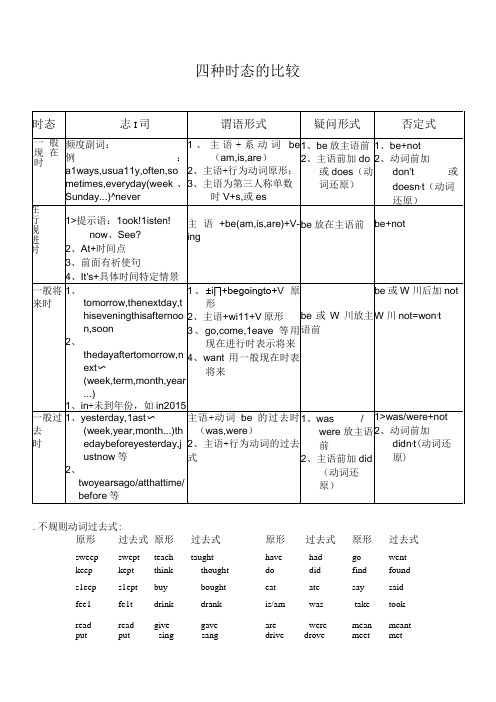
四种时态的比较.不规则动词过去式:原形过去式原形过去式原形过去式原形过去式sweep swept teach taught have had go wentkeep kept think thought do did find founds1eep s1ept buy bought eat ate say saidfee1fe1t drink drank is/am was take tookread read give gave are were mean meantput put sing sang drive drove meet metcut cut begin began speak spoke make made 1et1et ring rang write wrote see saw f1y f1ew run ran ride rode come came draw drew sit sat hear heard te11to1d1earn 1earned/grow grew1earntget got know knew一、用动词的适当形式填空1. Myparents(come)fromShandong.2. Sam(not1ike)p1ayingcomputergames.3. Thebeautifu1gir1(wear)g1asses.4. TheZhangfami1y(1ive)inaf1atinNanjing.5. Myfather1ikes(read)newspapersafterwork.6. Whatherc1assmates(ca11)herteacher?7. you(1ove)eachotherinyourfami1y?8. (be)yourcousinveryc1everatmaths?9. Sheisgoodatdancing.She(sing)verywe11,too.11. Amy(take)herdogforawa1keveryafternoon.12. Mr.1i(notteach)usmathsthisterm.(学期)13. Mr.Chen(not1ike)tea.He(enjoy)drinkingcoffee.14. yourfatheroften(p1ay)tennis?No,he1oves(read)newspapers.15. Everyoneinourc1ass(1ike)P.E.a1ot.16. Whoe1se(want)tocometoMi11ie,sparty?I.17. Manyofthem(work)hardattheir1essons.They(be)c1everatthem.18. WhatMary(have)forbreakfast?She(have)aneggandag1assofmi1k.19. Ourschoo1(be)abigniceschoo1.Andourteacher(be)agoodteacher.20.SimonandDanie1(be)American.二、句型转换。
一般现在时、现在进行时、一般过去时及一般将来时四种时态语言点归纳总结
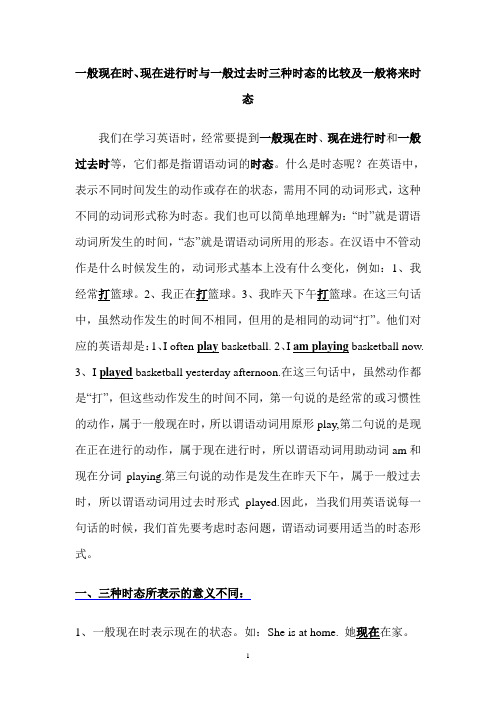
一般现在时、现在进行时与一般过去时三种时态的比较及一般将来时态我们在学习英语时,经常要提到一般现在时、现在进行时和一般过去时等,它们都是指谓语动词的时态。
什么是时态呢?在英语中,表示不同时间发生的动作或存在的状态,需用不同的动词形式,这种不同的动词形式称为时态。
我们也可以简单地理解为:“时”就是谓语动词所发生的时间,“态”就是谓语动词所用的形态。
在汉语中不管动作是什么时候发生的,动词形式基本上没有什么变化,例如:1、我经常打篮球。
2、我正在打篮球。
3、我昨天下午打篮球。
在这三句话中,虽然动作发生的时间不相同,但用的是相同的动词“打”。
他们对应的英语却是:1、I often play basketball. 2、I am playing basketball now.3、I played basketball yesterday afternoon.在这三句话中,虽然动作都是“打”,但这些动作发生的时间不同,第一句说的是经常的或习惯性的动作,属于一般现在时,所以谓语动词用原形play,第二句说的是现在正在进行的动作,属于现在进行时,所以谓语动词用助动词am和现在分词playing.第三句说的动作是发生在昨天下午,属于一般过去时,所以谓语动词用过去时形式played.因此,当我们用英语说每一句话的时候,我们首先要考虑时态问题,谓语动词要用适当的时态形式。
一、三种时态所表示的意义不同:1、一般现在时表示现在的状态。
如:She is at home. 她现在在家。
一般现在时也表示经常的或习惯性的动作。
如:He often plays basketball.他时常打篮球。
2、现在进行时表示现在进行时表示现在(说话瞬间)正在进行或发生的动作。
如:He is playing basketball now.他正在打篮球。
3、一般过去时表示表示过去某个时间存在的状态。
如:She was at home yesterday.她昨天在家。
(完整版)小学一般现在时-过去式-现在进行时-将来时讲解

四种时态的比较.不规则动词过去式:原形过去式原形过去式原形过去式原形过去式sweep swept teach taught have had go went keep kept think thought do did find found sleep slept buy bought eat ate say said feel felt drink drank is/am was take took read read give gave are were mean meantput put sing sang drive drove meet met cut cut begin began speak spoke make made let let ring rang write wrote see saw fly flew run ran ride rode come came draw drew sit sat hear heard tell toldgrow grew learn learned/learntget got know knew一、用动词的适当形式填空1. My parents _______ (come) from Shandong.2. Sam _______(not like) playing computer games.3. The beautiful girl _______(wear) glasses.4. The Zhang family _______(live) in a flat in Nanjing.5. My father likes _______(read) newspapers after work.6. What _______her classmates _______(call) her teacher?7. _______ you _______(love) each other in your family?8. _______(be) your cousin very clever at maths?9. She is good at dancing. She ________ (sing) very well, too.11. Amy ________(take) her dog for a walk every afternoon.12. Mr. Li ________(not teach) us maths this term. (学期)13. Mr. Chen ________(not like) tea. He ________(enjoy) drinking coffee.14. ________ your father often ________(play) tennis ?No, he loves ________(read) newspapers.15. Everyone in our class ________(like) P.E. a lot.16. Who else ________(want) to come to Millie’s party? I ________.17. Many of them ________(work) hard at their lessons. They _____ (be) cl ever at them.18. What _______ Mary _______(have) for breakfast ?She _______(have) an egg and a glass of milk.19. Our school ________(be) a big nice school. And our teacher ______(be ) a good teacher.20. Simon and Daniel ________(be) American.二、句型转换。
表示将来的时态(一般现在时表将来,现进表将来以及一般将来时)

我相信,中国将会变成世界上最富有的国家之一。
There is going to be a heavy rain.
将会பைடு நூலகம்一场大雨。
②be going to和will均可表示“意图”:事先考虑过的意图用be going to;不是 事先考虑的意图即临时决定的用will。 I’m going to Qingdao this weekend. 这个周末我要去青岛。 —Sorry,I forgot to buy the book you need. ——对不起,我忘了去买你要的书了。 —It doesn’t matter. I will go myself. ——没关系。我自己去买就行了。
一般现在时
在时间和条件状语从句中可用一般现在时代替
一般将来时。 I’ll let you know as soon as I hear from him. 我一接到他的信就告诉你。
现在进行时
有些动词,如come, go, leave, return, arrive,
begin, start等,它们的现在进行时可表示不远 的将来要发生的事情。例如: Flight 1095 is landing soon. 第1095号航班马上要着陆了。
(
(
)5. Look! Some visitors __ for the bus over there. (2015南宁) A. are waiting B. is waiting C. waiting D. Wait
( (
) 6. ---What were you doing at 5:30 yesterday afternoon? --- I ______ with Sam.(2016 钦州) A. walk B. walks C. was walking D. walked )7. — What are you going to do tomorrow?(2014 柳州) — I ______ visit my aunt. A. went to B .go to C. am going to
一般现在时表将来 现在进行时表将来

一般现在时表将来现在进行时表将来 用一般现在时表将来,只是用在条件或时间状语从句中,主将从现。
还有want 这样表示愿望的词,一般现在时可用来表示将来时。
下面小编就给大家介绍一下一般就现在时表将来和现在进行时表将来的用法,希望对你有帮助。
一般现在时表将来一.“主将从现”原则当主句为将来时态或表示将来意义时,时间和条件的状语从句必须用一般现在时表将来:I’ll write to her when I have time. 我有空会给她写信。
Turn off the lights before you leave. 走前关灯。
二除表示时间和条件的状语从句外,表示让步、相似、比例的从句也必须用一般现在时表将来:I’ll follow him wherever he goes. 他去哪儿,我就跟着去哪儿。
三.在make sure(弄清楚),make certain(弄清楚),take care(注意,当心),be careful(注意,当心),mind(注意),watch(注意)等后的that从句中通常也只用一般现在时表将来意义:We must take care that no one sees us. 我们必须注意别让人看见三.表示按规定、时间表、计划或安排要发生的动作:The train leaves at 12:00. 火车12点开出。
四.表示客观性很强的将来My birthday is on a Sunday this year. 我今年的生日在星期天。
五.在it doesn’t matter, I don’t care, I don’t mind 等结构(以及类似结构)后的名词性从句也通常用一般现在时表将来意义:It doesn’t matter where we go on holiday. 我们去哪儿度假都行。
六.在I hope , I bet, see (to it) 等后的宾语从句中通常用一般现在时表示将来意义,但有时也可直接用将来时态:I hope that you like [will like] it. 你希望你会喜欢它七.有。
一般现在时和现在进行时表将来的讲解

一般现在时和现在进行时表将来的讲解之勘阻及广创作(一)现在进行时暗示将来现在进行时暗示将来, 主要用于暗示按计划或安插要发生的举措.常有“意图”“安插”或“筹算”的含义.这种现在进行时比力生动, 给人一种期待感. 它常表最近或较近的将来, 所用动词多是转移动词. 表将来的现在进行时除用于转移动词外, 亦可用于某些非转移动词.能这样用的动词经常使用的有:arrive, come, do, get, go, have, leave, meet, play, return, see, spend, start, stay, wear, work 等.如:I’m leaving tomorrow. 我明天走.They’re getting married next month. 他们下个月结婚.Are you meeting Bill this evening? 你今晚将和比尔见面吗?1) come, go, stay, arrive, leave 等词的现在进行时经经常使用来暗示将来确切的计划.2) 暗示交通方式、行程安插的动词, 例如fly, walk, ride, drive, take(a bus, a taxi)等的现在进行时也经经常使用于暗示将来.但偶尔也暗示较远的将来.如:When I grow up, I’m joining the army. 我长年夜了要参军. 3)表将来的现在进行时有时含有“决心”的意思, 多用在否定结构中.如:I’m not going. 我不走了.I’m not waiting any longer. 我不再等了.有时也用在肯定结构中.如:I’m backing out. 我要打退堂鼓了.4)用这种现在进行时与对方讲话时可酿成命令, 不外语气比力温和.如:You are staying. 你留下吧.Don’t forget: you are taking part too. 不要忘记:你也要介入.5)现在进行时也可在时间、条件或原因状语从句中暗示将来.如:when you are passing my way, please drop in. 你什么时候路过我们家, 请进来坐.(用于时间状语从句)If they are not doing it, what am I to do? 如果他们不干, 那我该怎么办?(用于条件状语从句)She is going to the dentist tomorrow because she is having a tooth filled.6)暗示将来的现在进行时也可用在间接引语中, 暗示说话人相信它将是事实.如:He said he is going tomorrow. 他说他明天走.表将来的现在进行时有时附属于将来时态.如:On election night we’ll be telling you what’s happeningin various places in this country. 到了选举的夜晚, 我们将把全国各地的情况告诉年夜家.when I have time, I’ll come down to the school to see how you’re both doing. 我有空时, 会来学校看你们俩的学习情况.(when 引导的条件状语从句, 主将从现)(二)一般现在时表将来1.“主将从现”原则当主句为将来时态或暗示将来意义时, 时间和条件的状语从句必需用一般现在时表将来:I’ll write to her when I have time. 我有空会给她写信.Turn off the lights before you leave. 走前关灯.If we hurry, we may catch the bus. 如果赶紧走我们可能赶得上公共汽车.Tell me in case you get into difficulty. 遇到困难请告诉我.【注】① 除暗示时间和条件的状语从句外, 暗示让步、相似、比例的从句也必需用一般现在时表将来:I’ll follow him wherever he goes. 他去哪儿, 我就跟着去哪儿.Whatever you say, I won’t pay. 无论你说什么, 我都不会付钱.Whether we help him or not, he will fail. 无论我们帮他与否, 他城市失败.I’ll have a good time whether I win or lose. 赢也好, 输也好, 我都将会玩好.The more you eat, the fatter you will become. 你吃得越多就会越胖.② 另外, 当主句为用将来时态时, 定语从句也通经常使用一般现在时表将来:I’ll give you anything(that)you ask for. 你要什么我都给你.You can have anything I find. 我找到的任何工具你都可以拿去.Everyone who comes first will get a present. 每个先来的人都可获得一份礼物.2、简化原则依照英语习惯, 一个句子中若主要动词已经标明了所谈论举措的时间, 那么与之相关的其他动词就不用再次指明同一时间, 而往往使用一个比力简单的时态, 如用一般现在时暗示一般将来时等.比力:This discovery means that we will spend less on food.这一发现意味着我们将减少在食品上的花费.3、几种值得注意的情况在make sure(弄清楚), make certain(弄清楚), take care(注意, 把稳), be careful(注意, 把稳), mind(注意), watch(注意)等后的that从句中通常也只用一般现在时表将来意义: Take care that it does not occur again. 注意别再发生这样的事.We must take care that no one sees us. 我们必需注意别让人看见我们.Make sure you come back soon. 你要保证快点回来.Be careful that you don’t hurt her feelings. 把稳别伤了她的感情.Watch that the baby doesn’t go near the heater. 注意别让宝宝接近加热器.Mind(that) you read the examination questions carefully before you begin to answer them.在答题前要注意仔细阅读考题.【注】在it doesn’t matter, I don’t care, I don’t mind等结构(以及类似结构)后的名词性从句也通经常使用一般现在时表将来意义:It doesn’t matter where we go on holiday. 我们去哪儿度假都行.Does it matter who goes first? 谁先去这有关系吗?I don’t care whether we win or lose. 我不在乎我们是赢还是输.Don’t you care what happens to them? 难道你不关心他们出什么事了?4、可用两种时态的情况在I hope , I bet, see (to it)等后的宾语从句中通经常使用一般现在时暗示将来意义, 但有时也可直接用将来时态:I hope that you like [will like] it. 你希望你会喜欢它.I bet it rains [will rain] tomorrow. 我赌博明天会下雨.See (to it) that children don’t catch cold. 把稳别让孩子感冒.I’ll see that nobody disturbs [will disturb] you. 我将确保没人打搅你.【注】see (to it) 后的that从句通经常使用一般现在时表将来, 直接用将来的情形较少见.5、用于比力状语从句在as, than 引出的比力状语从句中可用一般现在时暗示将来, 也可直接用将来时态:We’ll get there as soon as you do [will]. 你一到, 我们就到.We’ll probably drive faster than you do [will]. 我们开车很可能比你快.6、暗示计划或安插暗示按规定、时间表、计划或安插要发生的举措:Are you on duty next weekend? 下周末你上班吗?The train leaves at 12:00. 火车12点开出.Where do we go now? 我们现在到哪里去? Her birthday is this time by next year..【注】用于此用法时, 句中通常有具体的时间状语.7、by the time…当主句为将来时态时, 与之相关的by the time后接的从句要用一般现在时暗示将来意义:By the time he comes, I will have left. 等他到时, 我会已离开了.The film will have started by the time we get to the cinema.我们到片子院时片子会已经开始了.8、暗示现在将要宣布某事I declare the meeting open. 我宣布会议开始.We learn Lesson Ten today. 今天我们学习第10课.9、暗示客观性很强的将来Today is Friday, so tomorrow is Saturday. 今天是星期五, 所以明天是星期六.My birthday is on a Sunday this year. 我今年的生日在星期天.【注】有时说话者对某一将来事实非常肯定, 也用一般现在时:The future is bright. 前途是光明的.Final victory is ours. 最后的胜利是我们的.三一般现在时与现在进行时暗示将来时的区别例析1、共同点两者均可与时间状语连用暗示已确定的将来安插.如:I leave [am leaving] the day after tomorrow.我预定后天走.The children start [are starting] school on Monday.孩子们星期一就要开学了.2、分歧点1)从个人色彩来看原则上说, 一般现在时比现在进行时具有的个人色彩更少.比力:I’m leaving tonight.(可能指的是我决定要离开)I leave tonight.(可能指的是这是计划的一部份, 但计划纷歧定是我订的)2)从是否正式来看在通常情况下, 一般现在时要比现在进行时听起来更为正式, 比如计划开办一个新分店的百货商店很可能说:Our new branch opens next week. 本店新设分店下周开业.但不说:Our new branch is opening next week.3)从是否简洁来看有时, 现在进行时显得累赘的处所就用一般现在时, 例如在谈到像旅程安插那样的一系列预定的将来的举措时, 可以这样说:We leave at six, arrive in Dublin at ten and take the plane on...我们6点动身, 10点达到都柏林, 并在……乘飞机……而不说:We are leaving at six, arriving in Dublin at ten and taking the plane on...4)在动词hope, take care that, make sure that等的宾语从句中.例如: I hope they have a nice time next week. 我希望他们下星期玩得开心. Make sure that the windows are closed before you leave the room. 离开房间前, 务必把窗户关了.五习题练习Ⅰ.用动词的适当形式填空 (15)1. Look, the bus is_______________! (come)2. We __________to Roman next week. (go)3. Mr.Black _________Shanghai in a few days. (leave)4. __________ you __________anything special tonight? (do)5. We _______ _________ him after the performance. ( meet )6. When__________Mr.Manning __________ his holiday? ( take )7. Are you ______________ home in the evening? ( stay )8. When_______ you __________ for London? (leave)9. They are____________ at home for this weekend. (relax)10. Do you like going ___________ (ride)?11. Look, he __________(sit) his brother.12. Beijing is a good place _________(go) sightseeing.13. She plans ________ (study) English.(Plan to do something )14. Look out! The train ______________ (leave).15. Keep quiet, I ___________ (read) a newspaper.II.句型转换 (10)1. We are going to the beach for weekend.(一般疑问句)________ ________ _______ to the beach for weekend?2. The Greens are going bike riding for holiday.(对划线部份提问)________ ________ the Greens_________ for holiday?3. They are going to Italy next week.(对划线部份提问)__________ _________ they __________ next week?4. It’s about 4 li away from my home to school. (对划线部份提问)___________________________________________.5. he, friends, now, his, with, play, football. (连词成句, 并用正确时态)_____________________________________________.1.I _______ for Hong Kong on Saturday. Will you see meoff at the airport?√. am leaving B. am left C. am going to leaveD. left2.I _______ to see grandma and help her with some housework every week.A.came √.am going to come eD.will come3.--What are Mr and Mrs Black doing?---They _______ tea in the garden.√4.My mother often asks me ______ early.A.get upB.got upC.getting up√.to get up5.We _______ to the park if it is fine tomorrow.√6.Look! One of the girls _______ the door.A.cleansB.is cleaningC.clean √.are cleaning7.If you don't feel well, you may just _________.A.stopped reading √.stop reading C.stopped toread D.stop to read8.There is going to _________a game in our school this afternoon.A.hasB.have √.be9.Stop! A little boy _______ the street.√.is crossing B.crosses C.crossed D.has crossed10.My mother is ill. I ______ stay at home and look afterher.A.has to √.must (主观上必需) C.would D.have to(客观上必需)11.--- Where's Mabel?---She _____ pingpong behind the teaching building.A.was playing √创作时间:二零二一年六月三十日创作时间:二零二一年六月三十日。
小学一般现在时-过去式-现在进行时-将来时讲解

四种时态的比较一般过去时1.一般过去时表示过去某个时间发生的动作或存在的状态,常和表示过去的时间状语连用。
一般过去时也表示过去经常或反复发生的动作。
2.Be动词在一般过去时中的变化:⑴am 和is在一般过去时中变为was。
(was not=wasn’t)⑵are在一般过去时中变为were。
(were not=weren’t)⑶带有was或were的句子,其否定、疑问的变化和is, am, are一样,即否定句在was或were后加not,一般疑问句把was或were调到句首。
3.句中没有be动词的一般过去时的句子否定句:didn’t +动词原形,如:Jim didn’t go home yesterday.一般疑问句:在句首加did,句子中的动词过去式变回原形。
如:Did Jim go home yesterday?特殊疑问句:⑴疑问词+did+主语+动词原形?如:What did Jim do yesterday?⑵疑问词当主语时:疑问词+动词过去式?如:Who went to home yesterday?4、规则动词的变化:5.不规则动词过去式:原形过去式原形过去式原形过去式原形过去式sweep swept teach taught have had go went keep kept think thought do did find found sleep slept buy bought eat ate say said feel felt drink drank is/am was take took read read give gave are were mean meant put put sing sang drive drove meet met cut cut begin began speak spoke make made let let ring rang write wrote see saw fly flew run ran ride rode come came draw drew sit sat hear heard tell told grow grew learn learned/ learnt get got know knew 【练习巩固】( )1.The two __________in the same class last year.A. areB. wasC. wereD. be( )2.---Where______ you______ ?----I went to buy some food for supper.A.are … goB.did … goC.do … goD. will … go( )3. "Why _______ she _______ angry?" "Because he _____ at him just now. A. did… get, shouted B. has…got…shoutedC. did… get… has shoutedD. has…got…has shouted( )4.__________ that worker __________in a shoe factory a year ago?A. Do, workB. Did, workedC. Did, workD. Does work ( )5_____ you ______ the film before ? Where ____ you _____ it ?A. Have… seen… did… seeB. Did…see…die…watchC. Have…seen… have… seenD. Did…see…have…seen二、填空1.Tom _______ (visit) a farm last week.2. The twins _______ (water) the flowers in the garden yesterday morning.3. I _______ (watch) a film with my friend last Friday.4. My father _______ (be) in London last year.5. What_______ (do) you do three days ago?6. _______ (be) there any parks here in 1950?7. What_________(do) you do just now? I __________ (wash) my clothes.三.按要求改写句子。
(完整版)一般现在时、一般过去时、一般将来时、现在进行时
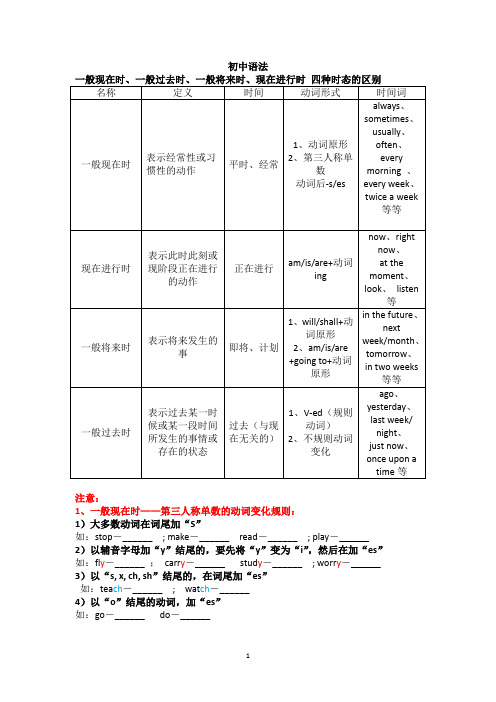
初中语法注意:1、一般现在时——第三人称单数的动词变化规则:1)大多数动词在词尾加“S”如:stop-______ ; make-______ read-______ ; play-______ 2)以辅音字母加“y”结尾的,要先将“y”变为“i”,然后在加“es”如:fl y-______ ;carr y-______ stud y-______ ; worr y-______ 3)以“s, x, ch, sh”结尾的,在词尾加“es”如:tea ch-______ ; wat ch-______4)以“o”结尾的动词,加“es”如:go-______ do-______2、现在进行时——动词ing形式的变化规则1.一般动词直接在词尾+ing例:read→______ (读)talk→______(交谈)sing→______(唱歌)2.以不发音e结尾的动词,先去e再加ing例:lik e→______喜欢writ e→______写skat e→______(滑冰)3.以重读闭音节结尾且末尾只有一个辅音字母的动词,双写末尾字母,再加ing 例:sto p→______(停止)ge t→______(得到)4.少数几个以ie结尾的动词,变ie为f再加ing。
例:l ie→______(躺、撒谎)t ie→______(系、捆绑)3、一般过去时——动词的变化规则(1) 一般在动词后加-ed。
如:play-______, offer-______, weigh-______, destroy-______, sign-______(2) 在以字母e结尾的动词后,只加-d。
如:lik e-______, provid e-______, hat e- ______ dat e-______(3) 在以“辅音字母+y”结尾的动词后,则改y为i,再加-ed。
如:suppl y-______, stud y- ______.(4) 在以单短元音的重读闭音节结尾且,末尾只有一个辅音字母的动词后,双写最后一个辅音字母,再加-ed。
一般现在时,一般将来,正在进行时
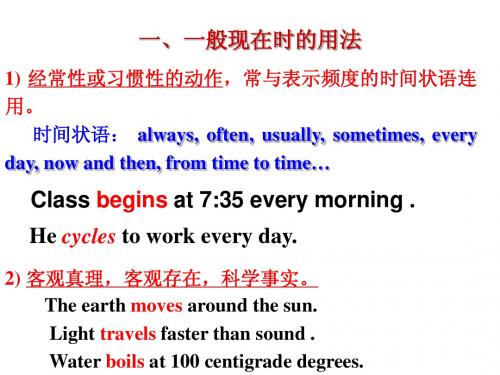
3) 心理状态的动词。如:know, realize, 心理状态的动词。 think, see, believe, suppose, imagine, agree, recognize, remember, want, need, forget, prefer, mean, understand, love, hate I need your help. He loves her very much. 4) 瞬间动词。如:accept, receive, 瞬间动词。 complete, finish, give, allow, decide, refuse. I accept your advice.
一、一般现在时的用法
1) 经常性或习惯性的动作,常与表示频度的时间状语连 经常性或习惯性的动作, 用。 时间状语: 时间状语: always, often, usually, sometimes, every day, now and then, from time to time… time…
Class begins at 7:35 every morning . He cycles to work every day.
.一般将来时表示计划 打算、 一般将来时表示计划、 1 .一般将来时表示计划、打算、企图做某事或来注 定要发生的事情。 定要发生的事情。 .表示将来时的四种形式 2 .表示将来时的四种形式 +动词原形 ①will /shall +动词原形 ②be going to do do(正要干什么 正要干什么) ③be about to do(正要干什么) ④be to do
1.You _____things about . Look, what a mess in you room! A. always throw B. have always thrown C. are always throwing D. have always been thrown 2.You ______ television. Why not do something more active? A. always watch B. are always watching C. have always watched D. have always been watching
最新一般现在时、现在进行时、一般将来时、一般过去时知识点总结资料
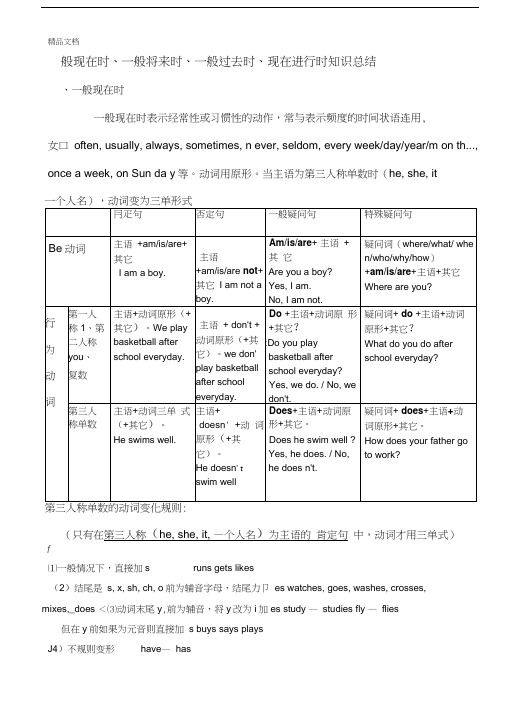
般现在时、一般将来时、一般过去时、现在进行时知识总结、一般现在时一般现在时表示经常性或习惯性的动作,常与表示频度的时间状语连用,女口often, usually, always, sometimes, n ever, seldom, every week/day/year/m on th..., once a week, on Sun da y等。
动词用原形。
当主语为第三人称单数时(he, she, it一个人名),动词变为三单形式第三人称单数的动词变化规则:(只有在第三人称(he, she, it, —个人名)为主语的肯定句中,动词才用三单式)f⑴一般情况下,直接加s runs gets likes(2)结尾是s, x, sh, ch, o前为辅音字母,结尾力卩es watches, goes, washes, crosses,mixes,_does <⑶动词末尾y,前为辅音,将y改为i加es study —studies fly —flies 但在y前如果为元音则直接加s buys says playsJ4)不规则变形have—has二、一般将来时一般将来时表示将来发生的事。
常与tomorrow, n ext day/week/mo nth/year…, soon, in a few mi nu tes, the day after tomorrow, i n the future等时间状语连用。
Will/shall + 动词原形;(shall 用语第一人称) be(am/is/are) going to+ 动词原形三、一般过去时一般过去时表示过去某一时候或某一段时间所发生了的事情或存在的状态。
常与过去时间yesterday, ago, this morning, just now, a moment ago last night / year / week/ mon th, once upon a time the other day, before, the day before yesterday, in 1989, at the age of five, one day, ther那时),on that day, in the past连用。
一般现在时、现在进行时、一般将来时、一般过去时知识点总结
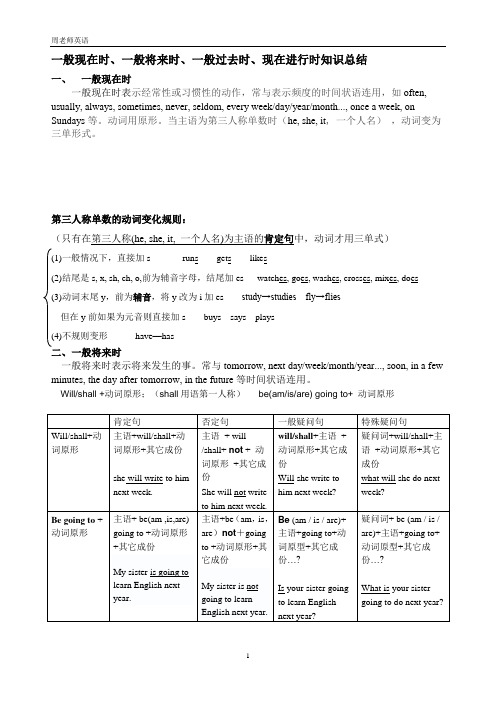
一般现在时、一般将来时、一般过去时、现在进行时知识总结一、一般现在时一般现在时表示经常性或习惯性的动作,常与表示频度的时间状语连用,如often, usually, always, sometimes, never, seldom, every week/day/year/month..., once a week, on Sundays等。
动词用原形。
当主语为第三人称单数时(he, she, it, 一个人名),动词变为三单形式。
第三人称单数的动词变化规则:(只有在第三人称(he, she, it, 一个人名)为主语的肯定句中,动词才用三单式)(1)一般情况下,直接加s runs gets likes(2)结尾是s, x, sh, ch, o,前为辅音字母,结尾加es watches, goes, washes, crosses, mixes, does(3)动词末尾y,前为辅音,将y改为i加es study→studies fly→flies但在y前如果为元音则直接加s buys says plays(4)不规则变形have—has二、一般将来时一般将来时表示将来发生的事。
常与tomorrow, next day/week/month/year..., soon, in a few minutes, the day after tomorrow, in the future等时间状语连用。
Will/shall +动词原形;(shall用语第一人称)be(am/is/are) going to+ 动词原形三、一般过去时一般过去时表示过去某一时候或某一段时间所发生了的事情或存在的状态。
常与过去时间yesterday,ago, this morning,just now,a moment ago,last night / year / week/month,once upon a time,the other day,before,the day before yesterday, in 1989, at the age of five, one day, then(那时), on that day,in the past连用。
一般现在时和现在进行时及表示将来的用法
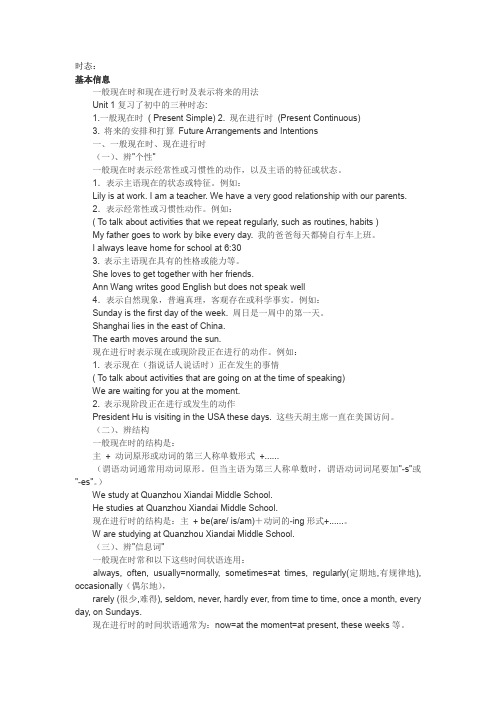
时态:基本信息一般现在时和现在进行时及表示将来的用法Unit 1复习了初中的三种时态:1.一般现在时( Present Simple)2. 现在进行时(Present Continuous)3. 将来的安排和打算Future Arrangements and Intentions一、一般现在时、现在进行时(一)、辨"个性"一般现在时表示经常性或习惯性的动作,以及主语的特征或状态。
1.表示主语现在的状态或特征。
例如:Lily is at work. I am a teacher. We have a very good relationship with our parents.2.表示经常性或习惯性动作。
例如:( To talk about activities that we repeat regularly, such as routines, habits )My father goes to work by bike every day. 我的爸爸每天都骑自行车上班。
I always leave home for school at 6:303. 表示主语现在具有的性格或能力等。
She loves to get together with her friends.Ann Wang writes good English but does not speak well4.表示自然现象,普遍真理,客观存在或科学事实。
例如:Sunday is the first day of the week. 周日是一周中的第一天。
Shanghai lies in the east of China.The earth moves around the sun.现在进行时表示现在或现阶段正在进行的动作。
例如:1. 表示现在(指说话人说话时)正在发生的事情( To talk about activities that are going on at the time of speaking)We are waiting for you at the moment.2. 表示现阶段正在进行或发生的动作President Hu is visiting in the USA these days. 这些天胡主席一直在美国访问。
一般现在时现在进行时一般将来时一般过去时知识点总结

一般现在时现在进行时一般将来时一般过去时知识点总结一般现在时、一般将来时、一般过去时、现在进行时知识总结一、一般现在时一般现在时表示经常性或惯性的动作,常与表示频度的时间状语连用,如often, usually, always, sometimes, never, seldom, every week/day/year/month...,once a week, on Sundays等。
动词用原形。
当主语为第三人称单数时(he, she, it,一个人名),动词变为三单形式。
Be动词肯定句主语+am/is/are+其它I am a boy.否定句一般疑问句Am/is/are+主语+其它Are you a boy? Yes, I am.No, I am not.Do+主语+动词原形+其它?Do you play basketball after school everyday? Yes, we do. / No, we don't.Does+主语+动词原形+其它。
Does he swim well ? Yes, he does. / No, XXX't.非凡疑问句疑问词(where/what/ when/who/why/how)+am/is/are+主语+别的Where are you?疑问词+do+主语+动词真相+别的?What do you do afterschool everyday?主语+am/is/arenot+别的I am not aXXX.第一人主语+动词原形(+主语+don't+行称I、第其它)。
We play动词原形(+其它)。
wedon’t为二人称basketball afteryou、XXX.playbasketball动复数after schoolXXX.词第三人主语+动词三单主语+称单数式(+别的)。
doesn’t+动词真相(+其XXX.它)。
XXX’tswim well.疑问词+does+主语+动词原形+其它。
现在进行时表将来和一般将来时的应用和区分(推荐)

现在进行时表将来和一般将来时的应用和区分(推荐)第一篇:现在进行时表将来和一般将来时的应用和区分(推荐)现在进行时表将来和一般将来时的应用和区分答:现在进行时表示将来主要用在以下几个方面:1.表示对最近的将来的确定的安排,例如:Miss Li and I are meeting tonight.我和李老师今天晚上要见面。
We are going to meet tonight.今晚我们要见面。
2.表示没有准备好细节的安排或计划。
I am visiting my frinds in New York.我准备看望我那些在New York的朋友。
3.用在时间状语或条件状语从句中表示将来,强调动作的持续性。
If I am still sleeping when he comes, wake me up, please!如果他来的时候我还在睡觉,请叫醒我。
如果对这种用法和一般将来时有混淆,可以看一下下面的句子:Miss Li and I are meeting tonight.我和李老师今天晚上要见面。
Miss Li and I will meet tonight.今天晚上我和李老师就要见面了。
这两个句子都是说我们两个要见面,可是从翻译上却看不出太大的区别,是不是?所以语言环境是非常重要的。
比如你和我一直想一起聚聚,终于我们在电话中约定今天晚上见面,你会怎样告诉你的父母这件事情呢?对了Miss Li and I are meeting tonight.如果我们素不相识,只在网上有过联系,你知道今天晚上我在精华学校有一节课,而你也正好要去上这节课,你又会怎样告诉父母呢?没错:Miss Li and I will meet tonight.再比如全家要去度假,你提议:We are going to Shanghai.爸爸说:We are going to New York.最后妈妈总结:We will stay at home.该如何理解呢?没错,你和爸爸都是在说你们的计划和安排,未必会实现。
一般现在时 现在进行时 一般将来时 一般过去时四大时态讲解表格对比总结

四大时态总结--------一般现在时、一般将来时、一般过去时、现在进行时一、一般现在时一般现在时表示经常性或习惯性的动作,常与表示频度的时间状语连用,如often, usually, always, sometimes, never, seldom, every week/day/year/month..., once a week, on Sundays等。
动词用原形。
当主语第三人称单数的动词变化规则:(只有在第三人称(he, she, it, 一个人名)为主语的肯定句中,动词才用三单式)(1)一般情况下,直接加s runs gets likes(2)结尾是s, x, sh, ch, o,前为辅音字母,结尾加es watches, goes, washes, crosses, mixes, does(3)动词末尾y,前为辅音,将y改为i加es study→studies fly→flies但在y前如果为元音则直接加s buys says plays(4)不规则变形have—has二、现在进行时现在进行时表示此时此刻或现阶段正在进行的动作。
常与now, at this time, these days, Listen! Look! at this(1)直接在动词后加ing. going, starting, working.(2)去掉词尾不发音的e,再加ing. leave--leaving, make---making.注意:如果单词结尾的e发音,则不能去掉,也直接加ing. see –seeing agree - agreeing .(3) 对于动词只有一个元音,而其后跟了一个辅音字母时,双写末尾辅音字母再加ing.sitting, beginning run – running stop – stopping cut – cutting control – controlling(4)以ie结尾,把ie变y再加ing。
一般现在时将来时进行时表格过去时
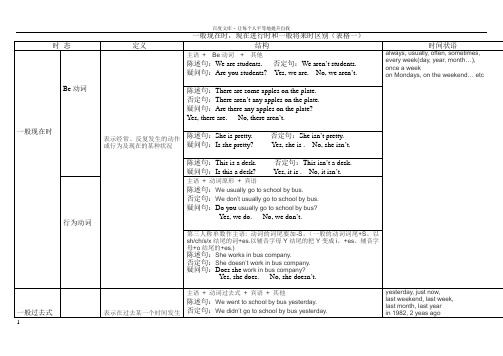
否定句:There aren’t any apples on the plate.
疑问句:Are there any apples on the plate?
Yes, there are. No, there aren’t.
疑问句:Is she going to buy a book tomorrow?
Yes, she is . No, she isn’t.
tomorrow,the day after tomorrow
next day(week, monthyear…),soon,
this morning/afternoon/evening,
时间状语
现在进行时
表示现阶段或说话时正在进行的动作及行为
主语+be+动词ing〔现在分词〕
陈述句:Listen, She is singing now.
否定句:Listen, She isn’t singing now.
疑问句:Listen, is she singing now?
Yes, she is . No, she isn’t.
疑问句:Are you students? Yes, we are. No, we aren’t.
always,usually,often, sometimes,
every week(day, year, month…),
once a week
on Mondays, on the weekend…etc
陈述句:She is pretty.否定句:She isn’t pretty.
疑问句:Is she pretty? Yes, she is . No, she isn’t.
- 1、下载文档前请自行甄别文档内容的完整性,平台不提供额外的编辑、内容补充、找答案等附加服务。
- 2、"仅部分预览"的文档,不可在线预览部分如存在完整性等问题,可反馈申请退款(可完整预览的文档不适用该条件!)。
- 3、如文档侵犯您的权益,请联系客服反馈,我们会尽快为您处理(人工客服工作时间:9:00-18:30)。
一般现在时和现在进行时表将来的讲解(一)现在进行时表示将来现在进行时表示将来,主要用于表示按计划或安排要发生的动作。
常有“意图”“安排”或“打算”的含义。
这种现在进行时比较生动,给人一种期待感。
它常表最近或较近的将来,所用动词多是转移动词。
表将来的现在进行时除用于转移动词外,亦可用于某些非转移动词。
能这样用的动词常用的有:arrive, come, do, get, go, have, leave, meet, play, return, see, spend, start, stay, wear, work 等。
如:I’m leaving tomorrow. 我明天走。
They’re getting married next month. 他们下个月结婚。
Are you meeting Bill this evening? 你今晚将和比尔见面吗?1) come, go, stay, arrive, leave 等词的现在进行时经常用来表示将来确切的计划。
2) 表示交通方式、行程安排的动词,例如fly,walk, ride, drive, take(a bus, a taxi)等的现在进行时也经常用于表示将来。
但偶尔也表示较远的将来。
如:When I grow up, I’m joining the army. 我长大了要参军。
3)表将来的现在进行时有时含有“决心”的意思,多用在否定结构中。
如:I’m not going. 我不走了。
I’m not waiting any longer. 我不再等了。
有时也用在肯定结构中。
如:I’m backing out. 我要打退堂鼓了。
4)用这种现在进行时与对方讲话时可变成命令,不过语气比较温和。
如:You are staying. 你留下吧。
Don’t forget: you are taking part too. 不要忘记:你也要参加。
5)现在进行时也可在时间、条件或原因状语从句中表示将来。
如:when you are passing my way, please drop in. 你什么时候路过我们家,请进来坐。
(用于时间状语从句)If they are not doing it, what am I to do? 如果他们不干,那我该怎么办?(用于条件状语从句)She is going to the dentist tomorrow because she is having a tooth filled.6)表示将来的现在进行时也可用在间接引语中,表示说话人相信它将是事实。
如:He said he is going tomorrow. 他说他明天走。
表将来的现在进行时有时从属于将来时态。
如:On election night we’ll be telling you what’s happening in various places in this country. 到了选举的夜晚,我们将把全国各地的情况告诉大家。
when I have time, I’ll come down to the school to see how you’re both doing. 我有空时,会来学校看你们俩的学习情况。
(when 引导的条件状语从句,主将从现)(二)一般现在时表将来1.“主将从现”原则当主句为将来时态或表示将来意义时,时间和条件的状语从句必须用一般现在时表将来:I’ll write to her when I have time. 我有空会给她写信。
Turn off the lights before you leave. 走前关灯。
If we hurry, we may catch the bus. 如果赶紧走我们可能赶得上公共汽车。
Tell me in case you get into difficulty. 遇到困难请告诉我。
【注】①除表示时间和条件的状语从句外,表示让步、相似、比例的从句也必须用一般现在时表将来:I’ll follow him wherever he goes. 他去哪儿,我就跟着去哪儿。
Whatever you say, I won’t pay. 无论你说什么,我都不会付钱。
Whether we help him or not, he will fail. 无论我们帮他与否,他都会失败。
I’ll have a good time whether I win or lose. 赢也好,输也好,我都将会玩好。
The more you eat, the fatter you will become. 你吃得越多就会越胖。
②另外,当主句为用将来时态时,定语从句也通常用一般现在时表将来:I’ll give you anything(that)you ask for. 你要什么我都给你。
You can have anything I find. 我找到的任何东西你都可以拿去。
Everyone who comes first will get a present. 每个先来的人都可得到一份礼物。
2、简化原则按照英语习惯,一个句子中若主要动词已经表明了所谈论动作的时间,那么与之相关的其他动词就不必再次指明同一时间,而往往使用一个比较简单的时态,如用一般现在时表示一般将来时等。
比较:This discovery means that we will spend less on food.这一发现意味着我们将减少在食品上的花费。
3、几种值得注意的情况在make sure(弄清楚),make certain(弄清楚),take care(注意,当心),be careful(注意,当心),mind(注意),watch(注意)等后的that从句中通常也只用一般现在时表将来意义:Take care that it does not occur again. 注意别再发生这样的事。
We must take care that no one sees us. 我们必须注意别让人看见我们。
Make sure you come back soon. 你要保证快点回来。
Be careful that you don’t hurt her feelings. 当心别伤了她的感情.Watch that the baby doesn’t go near the heater. 注意别让宝宝接近加热器。
Mind(that)you read the examination questions carefully before you begin to answer them.在答题前要注意仔细阅读考题。
【注】在it doesn’t matter, I don’t care, I don’t mind等结构(以及类似结构)后的名词性从句也通常用一般现在时表将来意义:It doesn’t matter where we go on holiday. 我们去哪儿度假都行。
Does it matter who goes first? 谁先去这有关系吗?I don’t care whether we win or lose. 我不在乎我们是赢还是输。
Don’t you care what happens to them? 难道你不关心他们出什么事了?4、可用两种时态的情况在I hope , I bet, see (to it)等后的宾语从句中通常用一般现在时表示将来意义,但有时也可直接用将来时态:I hope that you like [will like] it. 你希望你会喜欢它。
I bet it rains [will rain] tomorrow. 我打赌明天会下雨。
See (to it) that children don’t catch cold. 当心别让孩子感冒。
I’ll see that nobody disturbs [will disturb] you. 我将确保没人打扰你。
【注】see (to it) 后的that从句通常用一般现在时表将来,直接用将来的情形较少见。
5、用于比较状语从句在as, than 引出的比较状语从句中可用一般现在时表示将来,也可直接用将来时态:We’ll get there as soon as you do [will]. 你一到,我们就到。
We’ll probably drive faster than you do [will]. 我们开车很可能比你快。
6、表示计划或安排表示按规定、时间表、计划或安排要发生的动作:Are you on duty next weekend? 下周末你上班吗?The train leaves at 12:00. 火车12点开出。
Where do we go now? 我们现在到哪里去? Her birthday is this time by next year..【注】用于此用法时,句中通常有具体的时间状语。
7、by the time…当主句为将来时态时,与之相关的by the time后接的从句要用一般现在时表示将来意义:By the time he comes, I will have left. 等他到时,我会已离开了。
The film will have started by the time we get to the cinema.我们到电影院时电影会已经开始了。
8、表示现在将要宣布某事I declare the meeting open. 我宣布会议开始。
We learn Lesson Ten today. 今天我们学习第10课。
9、表示客观性很强的将来Today is Friday, so tomorrow is Saturday. 今天是星期五,所以明天是星期六。
My birthday is on a Sunday this year. 我今年的生日在星期天。
【注】有时说话者对某一将来事实非常肯定,也用一般现在时:The future is bright. 前途是光明的。
Final victory is ours. 最后的胜利是我们的。
三一般现在时与现在进行时表示将来时的区别例析1、共同点两者均可与时间状语连用表示已确定的将来安排。
如:I leave [am leaving] the day after tomorrow.我预定后天走。
The children start [are starting] school on Monday.孩子们星期一就要开学了。
2、不同点1)从个人色彩来看原则上说,一般现在时比现在进行时具有的个人色彩更少。
